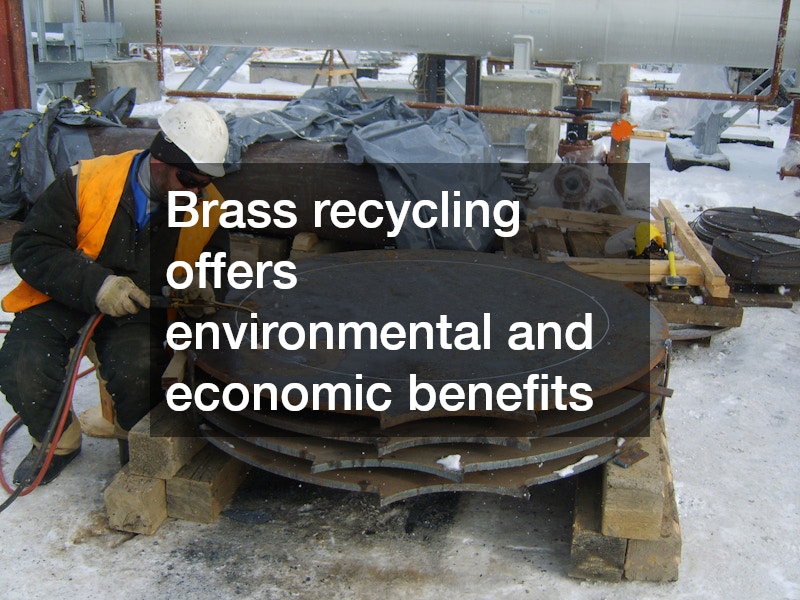Discover how using a brass metal recycling service can transform your scrap into valuable resources. This comprehensive guide will address the recycling process, the environmental benefits, and the economic value of brass recycling, showing you how to capitalize on what many see as waste.
What is Brass Recycling and Why is it Important?
The Environmental Impact of Brass Recycling
The environmental benefits of brass recycling are substantial, as it conserves natural resources. By recycling brass, we minimize the extraction of raw materials, which in turn reduces habitat destruction and soil erosion.
This process also decreases the overall carbon footprint of brass production by lowering energy consumption.
Recycling brass helps in reducing landfill waste, keeping harmful substances out of the environment. When brass is improperly disposed of, it can leach toxins into soil and water sources, leading to environmental degradation. By recycling, we can reduce the burden on landfills and prevent potential pollution.
The Economic Benefits of Recycling Brass
From an economic perspective, recycling brass is financially rewarding for both individuals and industries. The recycling industry creates jobs, supporting a wide array of career opportunities in collecting, processing, and selling recycled materials. This contributes to economic stability and growth, fostering new avenues for employment.
Recycled brass has considerable market value, allowing businesses to profit from what might have been considered waste. Industries can significantly reduce their production costs by incorporating recycled materials instead of purchasing new raw materials. Moreover, recycling operations enable the continuous supply of valuable metals back into the market, maintaining steady availability.
How Can You Start Recycling Your Brass Scrap?
Identifying Brass Scrap in Your Possessions
To start recycling brass, learn to identify items made from this versatile metal. Common household objects such as door handles, faucets, and musical instruments are often constructed from brass. Using a magnet can help distinguish brass from other metals, as brass is non-magnetic.
Sorting your scrap is crucial to ensure that what you collect can be readily processed by recycling facilities. Take care to separate brass from metals like steel and iron to avoid contamination and ensure optimal recycling efficiency. By accurately identifying brass, you maximize the recyclability of your scraps and potentially increase their value.
Finding a Reliable Brass Recycling Facility
Selecting the right recycling facility is critical to getting the most value for your brass scrap. Research and identify centers that specialize in brass and have a reputation for ethical and efficient processing. A reliable facility will provide transparent pricing structures, ensuring you receive fair compensation for your materials.
Facilities should comply with regulatory standards and implement environmentally responsible practices. Look for accreditations or certifications that signal adherence to industry standards. By choosing reputable centers, you support businesses committed to sustainable recycling practices and principled operations.
Preparing Your Brass for Recycling
Properly preparing your brass scrap can significantly enhance its recycling value. Begin by cleaning the brass to remove any dirt, paint, or debris that might contaminate the recycling process. This simple preparation step helps ensure a more efficient melting process and enhances the quality of the recycled product.
Disassemble items into their component parts to differentiate between pure brass and composite materials. Removing attachments like screws or non-metal components maximizes the purity of the scrap batch. This careful sorting heightens the likelihood of achieving optimal compensation from recycling centers.
What Are the Common Challenges in Brass Recycling?
Market Fluctuations and Their Impact on Brass Recycling
The brass recycling industry is subject to market fluctuations, which can affect pricing and demand for scrap materials. Economic changes, global demand shifts, and the availability of raw materials can influence the value of recycled brass. Consequently, recyclers and collectors need to stay informed about market trends to optimize their operations.
Such volatility can make it challenging for recyclers to predict revenue streams and set consistent pricing. However, understanding these market dynamics allows investors and businesses to navigate uncertainty effectively. By diversifying supply sources and market outlets, recyclers can mitigate the risks associated with price changes.
Contamination Issues in Brass Scrap
Contamination in brass scrap can severely impact the recycling process and reduce the material’s value. Elements like oil, paint, or foreign metals mixed with brass can complicate the recycling process, requiring additional treatment. Recyclers emphasize the importance of sourcing clean and sorted scrap to optimize efficiency.
Preventing contamination starts with effective sorting and cleaning practices at the collection stage. Paying attention to the purity of materials enhances the end value and reduces complications during processing. By minimizing contamination, recyclers can more efficiently transform scrap into high-quality recycled products.
Regulatory and Compliance Challenges
The brass recycling industry must navigate numerous regulatory and compliance challenges to uphold standards and avoid penalties. Regulations vary by region, covering everything from environmental standards to worker safety in recycling facilities. Staying informed about local and international laws ensures that operations remain compliant.
Complying with these regulations often requires substantial investment in updated technologies and training programs for employees. Facilities must implement rigorous safety protocols and adopt eco-friendly practices to meet established benchmarks.
Brass recycling is a vital practice that offers significant environmental and economic benefits. By understanding the process and overcoming common challenges, you can unlock the hidden value of your brass scrap and contribute to a more sustainable future.
.

